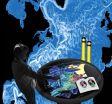(Press-News.org) The most pressing issues that UK marine science needs to address over the next two decades are the subject of a prospectus published as a themed issue of the Philosophical Transactions of the Royal Society A last month. The volume is co-edited and carries contributions by scientists based at the National Oceanography Centre Southampton (NOCS).
Human-induced changes in ocean processes are already being observed, and are projected to intensify as demand for the ocean's resources continues to increase. The prospectus, introduced as `A strategy for UK marine science for the next 20 years`, is a collection of papers written primarily by young to mid-career scientists in the fields of physical oceanography, ocean–ice sheet interactions, palaeoceanography, marine geoscience, biogeochemistry, biological oceanography, climate modelling and marine policy. This horizon-scanning exercise, driven by the Challenger Society for Marine Sciences and the UK Scientific Committee for Oceanic Research, is part of a wider plan to set out new initiatives for a marine science strategy in each of these research areas.
The authors provide a vision for their respective research areas, addressing the following questions:
What will my area of marine science be like in 20 years' time?
What will be the role of UK marine science in international science over that period?
What are the scientific challenges?
What technological advances are necessary to meet the challenges?
"The UK marine science strategy should be reviewed every two to four years by young to mid-career scientists," said Professor Harry Bryden FRS, who co-edited the volume. "This is essential to maintain the health of UK marine science."
The prospectus will also complement the marine research community vision and priorities document 'Setting Course', which was published and developed in 2011 by the National Oceanography Centre Association, by providing a more detailed, peer reviewed, scientific perspective on each of the research areas.
INFORMATION:
The themed issue 'Prospectus for UK marine science' was compiled and edited by Professors Harry L Bryden FRS and Gwyn Griffiths of NOCS, and Dr Carol Robinson of the University of East Anglia. Contributing authors include Professor Alberto Naveira Garabato of University of Southampton Ocean and Earth Science, which is based at NOCS.
Publication of this prospectus was made possible with support from: the Royal Society's Global Environment Research Committee; national centres (National
Oceanography Centre and British Antarctic Survey); and marine
industries (Planet Ocean, Horiba, Ocean Optics, RBR, Valeport, Ocean
Scientific International and RS Aqua).
Reference: Philosophical Transactions of The Royal Society A Mathematical Physical and Engineering Sciences, December 13, 2012; 370 (1980). Published online before print http://rsta.royalsocietypublishing.org/content/370/1980.toc.
Prospectus addresses most pressing marine science questions
2012-12-10
ELSE PRESS RELEASES FROM THIS DATE:
Just 28 percent of young people in Spain read either online or conventional newspapers each day
2012-12-10
A study at the Jaume I University in Castellón has verified the decrease in press consumption among young people between the ages of 16 and 30 years, which now stands at 28.8%. What is more, three out of every four individuals within this age bracket use social networking sites more than the television to get up to date.
News consumption habits among young people have changed radically in recent years. Since the beginning of the 21st century, various studies have indicated a decrease in readership of printed newspapers along with a constant fall in young readers.
"Just ...
Iron supplements reduce ADHD in low birth weight infants
2012-12-10
In a study published today in Pediatrics, scientists at Umeå University in Sweden conclude that giving iron supplements to low birth weight infants reduces the risk of behavior problems like ADHD later in life.
The study, Effects of Iron Supplementation on LBW Infants on Cognition and Behavior at 3 Years, is published in the January 2013 issue, released online Dec. 10, 2012.
In the randomized controlled trial, researchers in Sweden gave 285 marginally low birth weight infants either 0, 1 or 2 mg/kg and day of iron supplements from 6 weeks to 6 months of age. At age ...
Palliative care improves outcomes for seniors
2012-12-10
Seniors in long-term care experienced a significant reduction in emergency room visits and depression when receiving palliative care services, according to a recent collaborative study by researchers at Hebrew SeniorLife's Hebrew Rehabilitation Center (HRC) and Institute for Aging Research, both affiliated with Harvard Medical School (HMS).
The results of the study, published today in The Gerontologist, demonstrate the potential for improved end-of-life quality of care when palliative services are implemented in a long-term care setting.
The researchers analyzed the ...
Tracking gene flow in marine plant evolution
2012-12-10
A new method that could give a deeper insight into evolutional biology by tracing directionality in gene migration has just appeared in EPJ Data Science. Paolo Masucci from the Centre for Advanced Spatial Analysis, at University College of London, UK, and colleagues identified the segregation of genes that a marine plant underwent during its evolution. They found that the exchange of genes, or gene flow, between populations of a marine plant went westward from the Mediterranean to the Atlantic. This methodology could also be used to estimate the information flow in complex ...
Carbon nanotubes lower nerve-damaging chloride in cells
2012-12-10
DURHAM, N.C. -- A nanomaterial engineered by researchers at Duke can help regulate chloride levels in nerve cells that contribute to chronic pain, epilepsy, and traumatic brain injury.
The findings, published online Dec. 10, 2012, in the journal Small, were demonstrated in individual nerve cells as well as in the brains of mice and rats, and may have future applications in intracranial or spinal devices to help treat neural injuries.
Carbon nanotubes are a nanomaterial with unique features, including mechanical strength and electrical conductivity. These characteristics, ...
Tiny compound semiconductor transistor could challenge silicon's dominance
2012-12-10
CAMBRIDGE, Mass. -- Silicon's crown is under threat: The semiconductor's days as the king of microchips for computers and smart devices could be numbered, thanks to the development of the smallest transistor ever to be built from a rival material, indium gallium arsenide.
The compound transistor, built by a team in MIT's Microsystems Technology Laboratories, performs well despite being just 22 nanometers (billionths of a meter) in length. This makes it a promising candidate to eventually replace silicon in computing devices, says co-developer Jesús del Alamo, the Donner ...
Study of text messaging service shows participants prepared for motherhood
2012-12-10
Contact: Rachel Griffith
rgriffith@hmhb.org
703-797-1945
Contact: Kathy Fackelmann
kfackelmann@gwu.edu
202-994-8354
George Washington University
Study of text messaging service shows participants prepared for motherhood
Following last week's mHealth Summit, the largest event of its kind where leaders focus on how wireless technology can improve health outcomes, text4baby announced results from the first randomized evaluation of its service. The largest mobile health initiative in the U.S., text4baby was found to be an effective service for pregnant women.
...
'Public ecology' could help resolve mountaintop mining issues
2012-12-10
Mountaintop mining is the practice of using huge machines to remove layers of soil and rock to reach thin seams of coal.
It is an efficient way to reach the high-thermal value, low-impurity coal in the central Appalachian range, which accounts for one-fifth of the nation's coal, and it is a resource for American energy independence.
But it has disadvantages — mountaintops are deposited into valleys, trees and habitats are destroyed, chemical drainage may pollute streams, and many find it ugly.
Taking conflicts into account — such as the benefits of steady jobs and ...
Stem cell research provides hope for infertile cancer survivors
2012-12-10
Radiation and chemotherapy can pack a powerful punch against all kinds of cancers. Those who survive, however, are often left with bad news: Their treatments have rendered them infertile.
A UTSA professor has now demonstrated that it is possible to remove testicular stem cells from a monkey prior to chemotherapy, freeze them and later, after cancer treatments, transplant these cells where they can restart sperm production and restore fertility.
UTSA Assistant Professor Brian Hermann worked in collaboration with researchers at the University of Pittsburgh School of Medicine's ...
Benefit of PET or PET/CT in recurrent bowel cancer is not proven
2012-12-10
For patients in whom a recurrence of bowel cancer is suspected, the study data currently available allow no robust conclusions as to the advantages and disadvantages of using positron emission tomography (PET), alone or in combination with computed tomography (CT). This is because no studies have directly compared the benefits of these imaging techniques in recurrent colorectal carcinoma (bowel cancer) with conventional diagnostic techniques. Although PET or PET/CT show a higher diagnostic accuracy, i.e. in certain cases recurrences can be detected more reliably, it is ...

